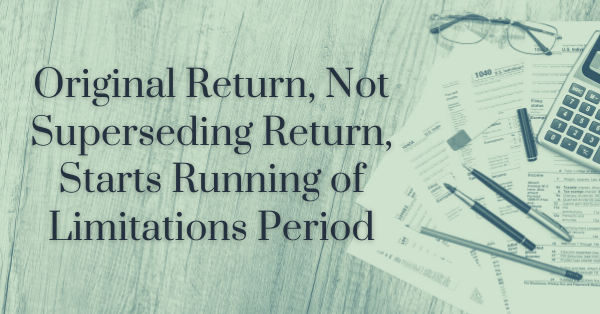Original Return, Not Superseding Return, Starts Running of Limitations Period

NTA Blog: Did You File a Superseding Return? If So, Read On
In a blog post, the National Taxpayer Advocate (NTA) has reminded taxpayers that the IRS now holds that the date a taxpayer files an original return, not the later date of any superseding return, is "the return" that starts the running of the various statutory limitation periods.
A superseding return is a return filed after a taxpayer files a return ("original return") and before the due date (including extensions) for the original return. An amended return is a return filed after an original or superseding return is filed and after the expiration of the filing period (including extensions) for the original return.
Under Code Sec. 6501(a), the IRS must assess additional tax for a given tax year within three years after "the return" for that year was filed.
Under Code Sec. 6511(a), if a taxpayer is filing a claim for a refund of any overpayment of tax, the taxpayer must file the claim within three years from the time "the return" was filed or two years from the time the tax was paid, whichever period expires later.
In February 2020, the Office of Chief Counsel looked at two issues regarding superseding returns:
Issue 1. When a taxpayer files an original return and then files a superseding return, which return constitutes "the return" for purposes of Code Sec. 6511 and starts the three-year statutory period for filing a claim?
Issue 2. When a taxpayer files an original return and then files a superseding return, which return constitutes "the return" for purposes of Code Sec. 6501 and starts the three-year statutory period for assessment?
The Chief Counsel determined that for both issues, the original return, not the superseding return, is "the return" that starts the running of the statutory limitations period. (Chief Counsel Advice 202026002, see Chief Counsel: superseding return does not restart limitations period for assessment, refund)
In July 2020, the IRS updated the Internal Revenue Manual to reflect the Chief Counsel's advice. (IRM 25.6.1.6.15)
NTA reminder. The NTA points out that once the statutory deadlines for the IRS to assess a tax liability and for a taxpayer to claim a refund have passed, the tax year, in most circumstances, is closed from both the IRS's and taxpayer's positions.
The NTA urges taxpayers who have filed superseding returns to pay close attention to how the Chief Counsel Advice and the IRS's update to the IRM regarding superseding returns affects these time periods for assessment and filing a refund claim.




